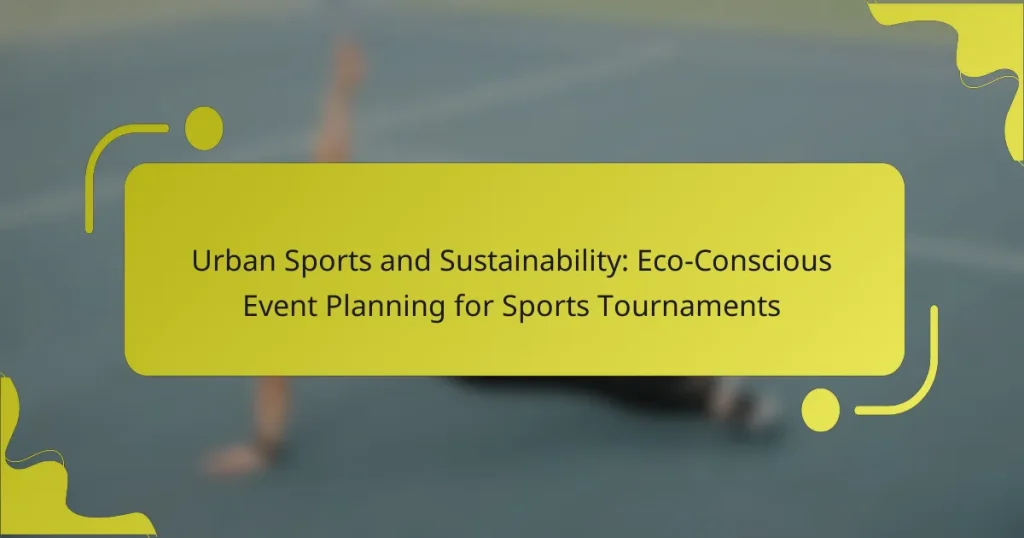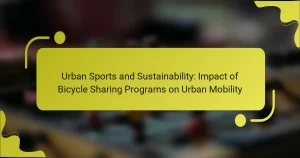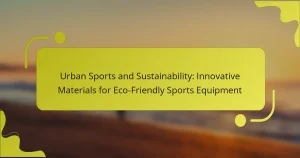Urban sports offer a unique opportunity to enhance sustainability in event planning. They promote eco-friendly practices, utilize existing urban spaces, and engage local communities. Essential strategies include waste reduction, sustainable transportation, and local partnerships. Technology plays a crucial role in optimizing resource use and minimizing environmental impact, ensuring future events align with sustainability goals.

How do urban sports contribute to sustainability in event planning?
Urban sports significantly enhance sustainability in event planning by promoting eco-friendly practices and community engagement. These sports often utilize existing urban spaces, reducing the need for new infrastructure. They encourage public transportation use, minimising carbon footprints. Additionally, urban sports events can incorporate sustainable materials, such as biodegradable equipment and reusable merchandise, which further reduces waste. Engaging local communities fosters a sense of ownership and responsibility towards environmental stewardship, making sustainability a shared goal.
What are the environmental benefits of urban sports tournaments?
Urban sports tournaments promote environmental benefits through sustainable practices and community engagement. These events often incorporate eco-friendly materials, reduce waste, and encourage public transportation use.
Additionally, urban sports tournaments can enhance local biodiversity by integrating green spaces and promoting the use of parks. As a result, they foster a sense of community and environmental stewardship among participants and spectators.
Implementing renewable energy sources at these events further minimises their carbon footprint. Engaging local businesses in sustainable initiatives also boosts the local economy while promoting environmental awareness.
In summary, urban sports tournaments can serve as platforms for environmental education, support sustainability, and strengthen community ties.
How can urban sports promote community engagement and awareness?
Urban sports can significantly enhance community engagement and awareness by fostering connections among participants and spectators. These activities promote inclusivity, allowing diverse groups to interact and collaborate.
Events centered around urban sports often emphasize sustainability, encouraging eco-friendly practices like waste reduction and local sourcing. This not only raises awareness about environmental issues but also inspires community members to adopt sustainable habits.
Moreover, urban sports serve as platforms for local organizations to promote their initiatives. By integrating community resources, these events can highlight social causes, enhancing public understanding and involvement.
Ultimately, urban sports create vibrant social spaces that strengthen community ties while advocating for sustainability and social responsibility.

Which eco-friendly practices are essential for planning sports events?
Essential eco-friendly practices for planning sports events include waste reduction, sustainable transportation, and energy efficiency. Implementing recycling programs minimises waste and promotes environmental responsibility. Encouraging public transport or cycling reduces carbon footprints. Utilizing renewable energy sources, like solar power, enhances sustainability.
What sustainable materials can be used in event infrastructure?
Sustainable materials for event infrastructure include bamboo, recycled plastics, and reclaimed wood. These materials minimise environmental impact and enhance eco-conscious event planning. Bamboo offers high strength and rapid growth, while recycled plastics reduce waste. Reclaimed wood provides unique aesthetics and supports sustainability. Incorporating these materials promotes a greener approach to urban sports events.
How does waste management impact urban sports tournaments?
Waste management significantly enhances urban sports tournaments by promoting sustainability and reducing environmental impact. Effective waste management strategies include recycling, composting, and minimising single-use plastics. These practices not only decrease landfill waste but also foster a culture of environmental responsibility among participants and attendees.
Additionally, tournaments that prioritise eco-conscious planning can attract more sponsors and participants who value sustainability. For example, a study found that events implementing green practices saw a 30% increase in attendance. This demonstrates that integrating waste management into event planning is beneficial for both the environment and the success of urban sports tournaments.

What role do local partnerships play in sustainable event planning?
Local partnerships are essential in sustainable event planning as they enhance resource sharing and community engagement. Collaborating with local businesses and organizations fosters a sense of ownership and responsibility towards environmental practices. These partnerships can provide eco-friendly materials, promote local talent, and reduce transportation emissions. Engaging local stakeholders also ensures that events reflect community values and priorities, leading to greater support and participation. Ultimately, local partnerships strengthen the sustainability framework of sports tournaments by integrating diverse perspectives and resources.
Which organizations support eco-conscious urban sports initiatives?
Several organizations support eco-conscious urban sports initiatives. Key players include the International Olympic Committee, which promotes sustainability in event planning, and the World Urban Games, focusing on urban sports and environmental responsibility. Local governments often collaborate with non-profits like Green Sports Alliance to enhance eco-friendly practices. Additionally, companies like Adidas and Nike invest in sustainable materials and practices for sports events. These collaborations emphasize reducing waste and promoting green initiatives in urban sports.
How can collaboration with local businesses enhance sustainability?
Collaboration with local businesses enhances sustainability by creating a network that supports eco-friendly practices. Local partnerships can reduce transportation emissions through sourcing materials and services nearby. This approach fosters community engagement, encouraging participants to support local economies while promoting sustainable initiatives. For example, using local vendors for food and supplies minimises waste and encourages the use of sustainable products.
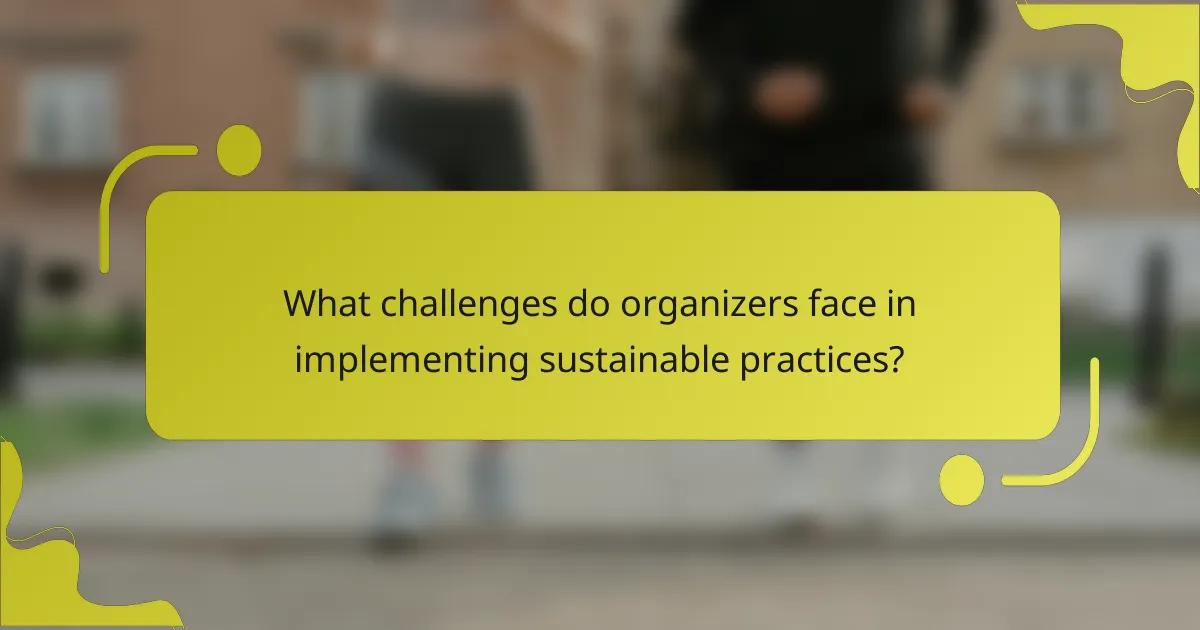
What challenges do organizers face in implementing sustainable practices?
Organizers face various challenges when implementing sustainable practices in urban sports events. Key difficulties include limited budgets, lack of awareness among stakeholders, and insufficient infrastructure for waste management.
Additionally, securing partnerships with eco-friendly vendors can be complex. The need for comprehensive planning to minimise environmental impact often conflicts with tight timelines. Engaging participants and attendees in sustainability initiatives also presents a significant hurdle.
How can budget constraints affect eco-conscious event planning?
Budget constraints can limit eco-conscious event planning by restricting sustainable options. Event organizers may face challenges in sourcing eco-friendly materials or venues. Additionally, reduced budgets can lead to compromises on waste management and transportation initiatives. Ultimately, financial limitations may hinder the overall sustainability goals of urban sports tournaments.
What are common misconceptions about sustainability in sports?
Many misconceptions about sustainability in sports include the belief that it is too costly or that it compromises performance. In reality, eco-conscious event planning can enhance brand image and reduce long-term costs. Additionally, some think that only large organizations can implement sustainable practices, while smaller events can also adopt eco-friendly measures effectively. Another common myth is that sustainability is solely about recycling, whereas it encompasses a broader range of practices, including energy efficiency and waste reduction.
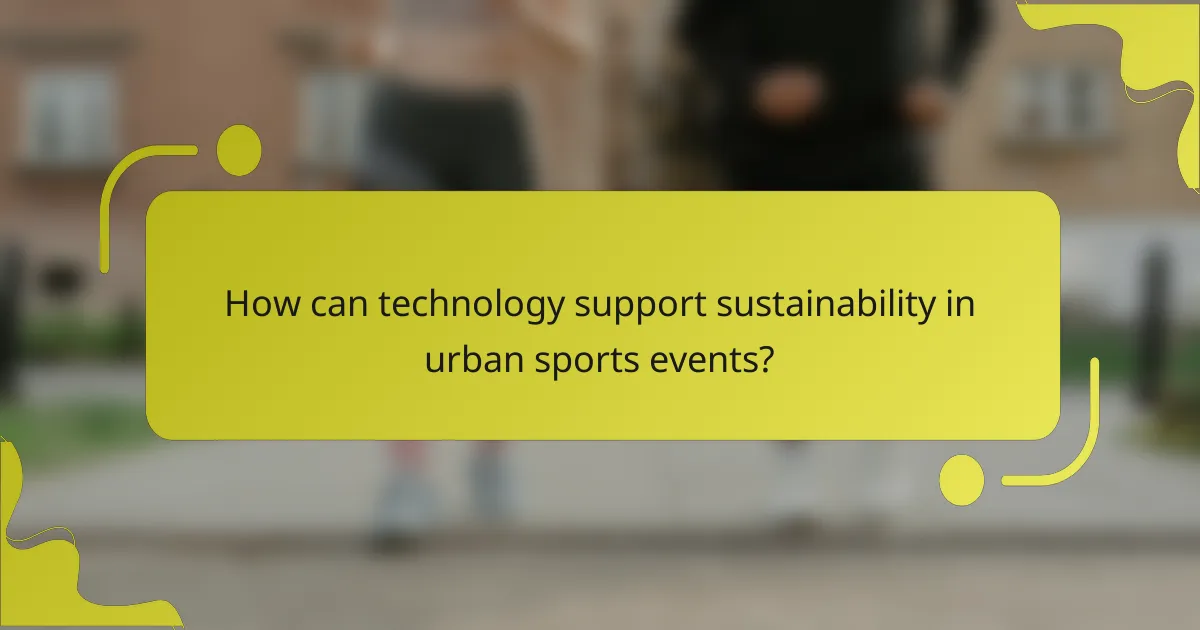
How can technology support sustainability in urban sports events?
Technology can enhance sustainability in urban sports events by optimizing resource use and reducing waste. Smart event management systems track energy consumption and waste generation, enabling organizers to make informed decisions. For instance, digital ticketing reduces paper waste, while real-time data analytics helps improve logistics and transportation efficiency. Additionally, renewable energy sources like solar panels can power facilities, further minimising the carbon footprint. Implementing these technologies supports eco-conscious planning, aligning urban sports events with sustainability goals.
What innovative solutions are being used to reduce carbon footprints?
Innovative solutions to reduce carbon footprints in urban sports events include sustainable venue selection, waste reduction strategies, and eco-friendly transportation options. Event planners are increasingly choosing venues with green certifications, utilizing digital ticketing to minimize paper waste, and promoting public transport or carpooling for attendees.
Additionally, incorporating renewable energy sources, such as solar panels, for power needs significantly lowers emissions. Engaging local communities in sustainability initiatives fosters a collective commitment to eco-conscious practices during tournaments. These strategies not only enhance the event’s reputation but also contribute to long-term environmental benefits.
How can data analytics improve sustainability efforts in sports?
Data analytics significantly enhances sustainability efforts in sports by optimizing resource management. It enables event planners to track energy consumption, waste production, and carbon emissions during tournaments. By analyzing this data, planners can identify areas for improvement, such as reducing plastic use or enhancing transportation efficiency. For instance, using analytics to assess attendee travel patterns can lead to more sustainable transportation options, minimizing environmental impact. Additionally, real-time monitoring can help adjust resource allocation dynamically, ensuring eco-conscious practices are maintained throughout the event.
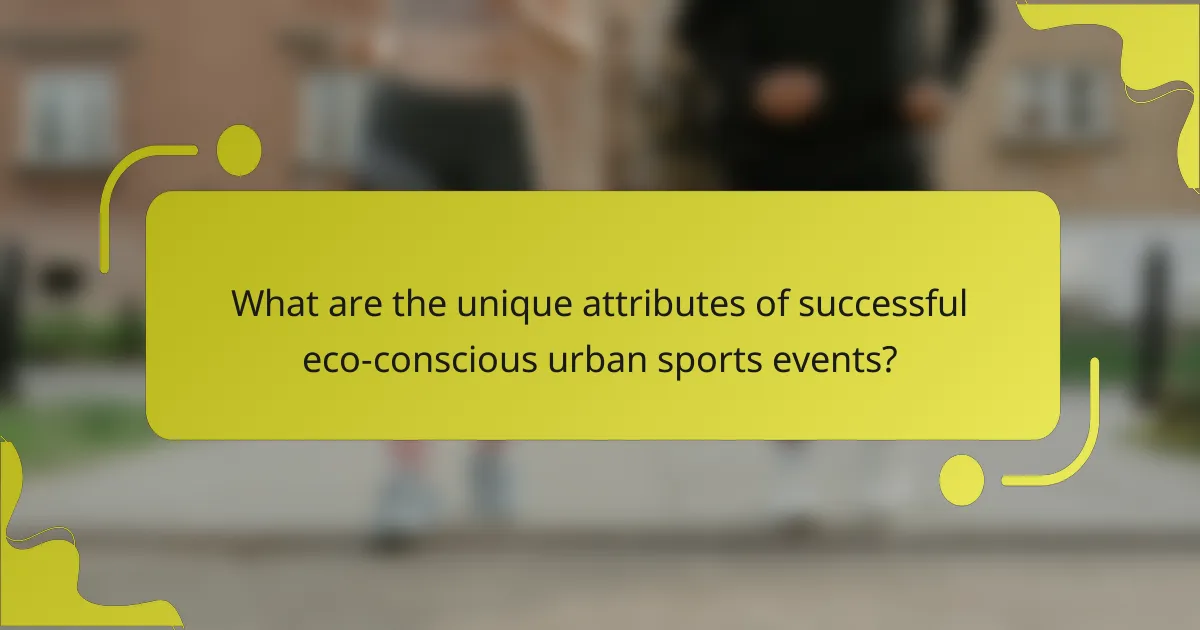
What are the unique attributes of successful eco-conscious urban sports events?
Successful eco-conscious urban sports events feature unique attributes such as community engagement, waste reduction strategies, local partnerships, sustainable transportation options, and environmentally friendly materials. These elements differentiate them from traditional events and promote sustainability. Community involvement fosters a sense of ownership, while waste reduction initiatives minimize environmental impact. Collaborating with local businesses strengthens community ties, and sustainable transport encourages eco-friendly practices. Using environmentally friendly materials enhances the overall sustainability of the event.
Which cities are leading the way in sustainable sports tournaments?
Cities leading in sustainable sports tournaments include Barcelona, Copenhagen, Vancouver, and Sydney. These urban centers prioritize eco-conscious event planning through renewable energy use, waste reduction, and community engagement. For instance, Copenhagen’s commitment to carbon neutrality by 2025 influences its event strategies. Barcelona leverages its rich cultural heritage while implementing green logistics for major events. Vancouver integrates sustainability into its sports infrastructure, promoting eco-friendly transport options. Sydney’s initiatives focus on minimizing environmental impact during large-scale sports events, showcasing a model for future tournaments.
What innovative formats are emerging in urban sports to enhance sustainability?
Innovative formats in urban sports are emerging to enhance sustainability through eco-friendly practices. These formats include zero-waste events, carbon-neutral tournaments, and the use of renewable energy sources. For example, some events now prioritize digital ticketing to reduce paper waste and employ sustainable transportation options for participants. Additionally, urban sports festivals are incorporating local food vendors to minimize carbon footprints associated with transportation. Community engagement in sustainability initiatives, such as tree planting during events, further solidifies the commitment to eco-conscious practices.
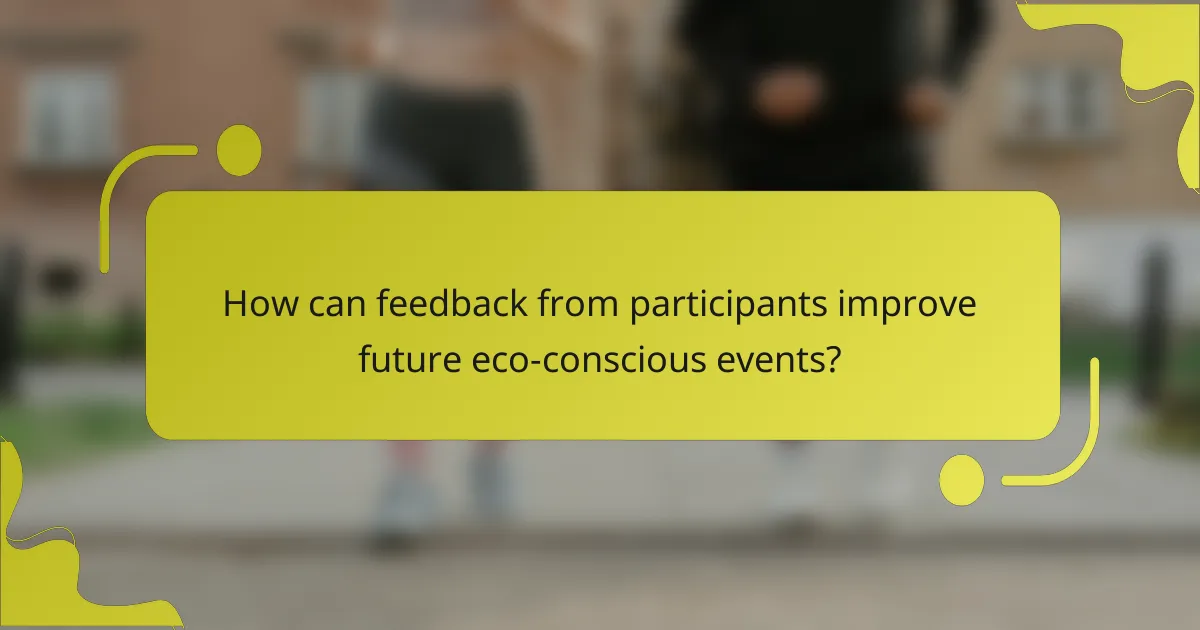
How can feedback from participants improve future eco-conscious events?
Feedback from participants significantly enhances future eco-conscious events by identifying strengths and areas for improvement. Gathering insights on sustainability practices, waste management, and participant engagement helps organizers refine strategies. For instance, suggestions on reducing plastic usage or improving recycling efforts can lead to measurable environmental benefits. Analyzing participant feedback creates a cycle of continuous improvement, ensuring that each event becomes more sustainable and aligned with community expectations.
What methods can be used to gather participant feedback effectively?
Surveys, focus groups, and digital feedback tools effectively gather participant feedback. These methods encourage honest input and promote engagement in eco-conscious event planning. Surveys can be distributed online, while focus groups foster discussion among participants. Digital tools provide real-time feedback, enhancing responsiveness.
How can lessons learned from past events shape future sustainability efforts?
Lessons learned from past events can significantly enhance future sustainability efforts in urban sports. Analyzing previous tournaments reveals successful eco-conscious strategies, such as waste reduction and energy efficiency. For instance, events that implemented comprehensive recycling programs saw a 30% decrease in landfill waste. Additionally, engaging local communities fosters support and awareness, leading to more sustainable practices. Utilizing renewable energy sources, as seen in recent tournaments, can further reduce carbon footprints. By applying these insights, future sports events can promote sustainability effectively.
What best practices should organizers follow for sustainable urban sports tournaments?
Organizers should prioritize eco-friendly practices to ensure sustainable urban sports tournaments. Implementing waste reduction strategies, promoting public transport, and using renewable resources are essential steps.
1. Reduce waste by using digital tickets and minimizing single-use plastics.
2. Encourage participants and attendees to utilize public transportation or carpool.
3. Select venues that prioritize sustainability and have eco-certifications.
4. Incorporate local food vendors to reduce carbon footprint and support the community.
5. Measure the event’s environmental impact to identify areas for improvement.
